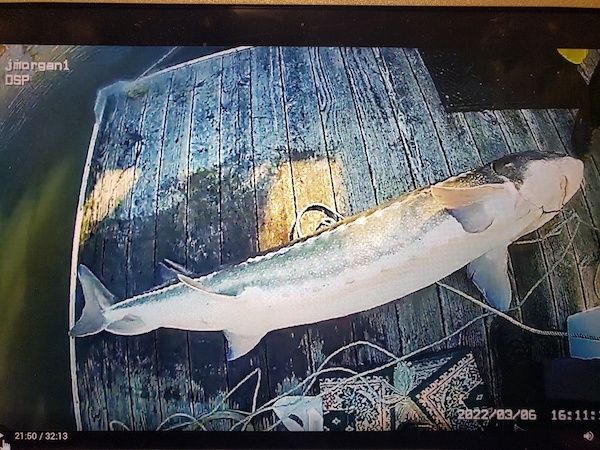THE FOLLOWING IS A PRESS RELEASE FROM THE OREGON DEPARTMENT OF FISH AND WILDLIFE
A giant white sturgeon more than seven feet long was among five sturgeon seized and released by OSP F&W Troopers responding to a report of poaching in Scappoose Bay this month. Poachers face felony charges after breaking numerous fishing laws.

Sportsmen fishing along the banks of Scappoose Bay noticed people fishing from a boat had caught a sturgeon but did not release it as required by law. The legal anglers reported what they saw to OSP Fish and Wildlife Troopers, who began monitoring the area. After two days of surveillance, Troopers Scott Bernardi and Justin Morgan, both from the St Helens office, approached the men where they were moored at the dock.
The subjects claimed that they had not caught any fish. However, Troopers could see two lines extending from the dock into the water. When they pulled up the lines, they found four live sturgeon that had been secured under water. While inspecting the boat, they found the 88-inch giant white sturgeon. It takes between 50 and 80 years for sturgeon to reach that length. The biggest sturgeon are usually females because they require more room for increased egg production, according to ODFW Columbia River program manager, Tucker Jones. This fish was most likely a female.
One angler admitted to retaining all the fish and was cited and released for Take/Possession of Oversized White Sturgeon, which is a class C Felony under new charge classifications, according to officials. In addition, Troopers issued citations for misdemeanor crimes including Take/Possession of White Sturgeon, No Resident Angling License and Angling Prohibited Method-Barbed Hooks, No Resident Angling License and No Combined Angling Tag. Troopers seized Two rods with reels, along with a barbed hook as evidence.
The legal fishermen who reported the crime qualify for rewards through the Turn In Poachers (TIP) Reward Program. The program offers cash rewards or hunter preference points to people who report fish and wildlife crimes that result in an arrest or citation.
All five sturgeon were released back into the bay alive, which is a relief to conservationists. White sturgeon, once plentiful in Oregon waterways, are culturally and ecologically significant, and are a Pacific Northwest icon. Referred to as a living-dinosaur among fish, the sturgeon is long-lived and revered as “living fossils” because they have remained nearly unchanged since they first evolved around 200 million years ago.
White sturgeon fisheries in the lower Columbia and Willamette rivers currently generate between 30,000 – 40,000 angler trips annually, which contribute millions in economic benefits. While most sturgeon fisheries are catch-and-release, there are still limited opportunities for retaining sturgeon, but lower populations of the slow-growing fish mean fewer opportunities to take one home. So it is important for everyone that anglers only harvest fish during legal retention seasons and adhere to size and bag limits.
An 80-year-old giant sturgeon is a valued contributor to the breeding stock. Sturgeon don’t reach breeding maturity until they are about 20 years old, and about six feet long. They can live to be 100 years or older. Older female sturgeon can produce ten times the number of eggs as young females and may carry up to 100 pounds of eggs. Sturgeon caviar can sell for as much as $100 per ounce packaged and sold in black market caviar markets, although poachers receive only a small fraction of that amount in their dark corner deals. Still, poachers continue to ply Oregon rivers, contributing to an ongoing reduction of the fishery.
The overall abundance of white sturgeon is only a fraction of what it was 150 years ago, according to Jones.
“Sturgeon are a long-lived, slow-growing, and late-maturing species,” Jones said. “Management actions taken today can have repercussions long into the future and rebuilding efforts can be quite prolonged. They already face numerous ecological, environmental, and other human-caused challenges on the road to recovery—poaching, especially of adult over-size sturgeon, is a huge issue.”
Stop Poaching campaign coordinator Yvonne Shaw states the importance of the TIP Line.
“The TIP Line is a key tool to fight poaching,” she said, “People who call the TIP Line to report poaching or suspected poaching, can remain anonymous and they also can get cash rewards or hunter preference points if their tip leads to an arrest or citation.”
The Stop Poaching Campaign educates the public on how to recognize and report poaching. This campaign is a collaboration among hunters, conservationists, land owners and recreationists. Our goal is to increase reporting of wildlife crimes through the TIP Line, increase detection by increasing the number of OSP Fish and Wildlife Troopers and increase prosecution. This campaign helps to protect and enhance Oregon’s fish and wildlife and their habitat for the enjoyment of present and future generations. Contact campaign coordinator Yvonne Shaw for more information. Yvonne.L.Shaw@odfw.oregon.gov.




